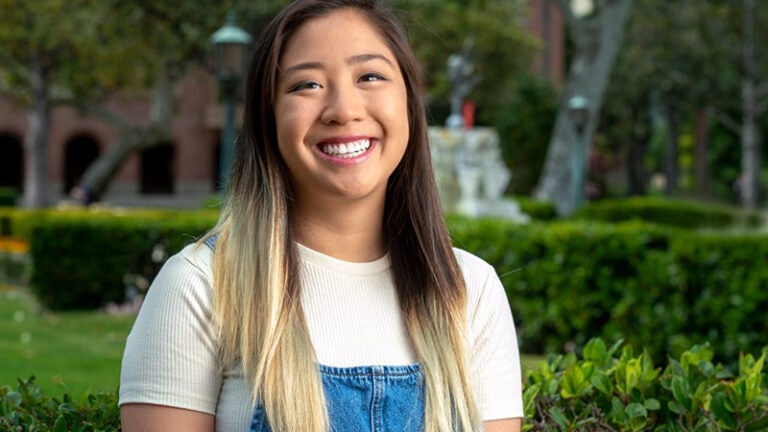
USC valedictorian Ivana Giang combats global education inequality
Growing up around beauty salons in suburbs of Ohio, Ivana Giang saw two worlds.
She would be surrounded by other Vietnamese women doing hair and nails, including her mom and aunts, who owned the shops. She often worked the register or swept floors. Then she would go off to study, working for the higher education her mom and aunts dreamed of.
The child of Vietnamese refugees, Giang knew what her parents endured to get to the United States. Her dad was forced to leave the country by boat at age 15 by himself. He eventually settled in the U.S and met her mom in Columbus, who had arrived just a few years after him after escaping Vietnam where her father — Giang’s grandfather — had been a prisoner of war.
USC 2019 valedictorian rallies against inequality
Giang, the 2019 valedictorian, knows the importance of access to education. She wouldn’t have made it to USC without a full scholarship — financially, it would be impossible.
While at USC, she’s made it her mission to advocate against the disparities in educational resources that she herself faced, whether it’s around the world or in her own backyard.
Her junior year, during a semester abroad in Nicaragua, she reported on the impact of NGOs that build schools in rural communities. While they provide access to education, she found the work done by American tourists was low-skill and could have easily been supplied by local workers, which would avoid disrupting the local economy. In a country that has experienced historical intervention by the U.S., it nailed down the importance of listening — the focus of her global studies honors thesis.
“It’s about respecting the narratives of people who have been disempowered throughout history,” Giang said. “It’s about listening to what they have to say — making sure they have the tools and resources to decide for themselves how they want to live as a community.”
Impact on school integration to racial resegregation
Studying both global studies at USC Dornsife College of Letters, Arts and Sciences and public policy at USC Price School of Public Policy, she wanted to put her NGO experience to use with an understanding of U.S. politics. After Nicaragua, she spent the summer interning for Sen. Dianne Feinstein. On Capitol Hill, she had the chance to meet with researchers studying school integration. And in the weeks after President Donald Trump rescinded Obama-era affirmative action guidelines for universities, she asked Education Secretary Betsy DeVos what her office planned to do about rising racial resegregation in public schools.
The experience led her to research the problem with USC Dornsife’s Ann Owens, associate professor of sociology and management, culling federal data for her public policy senior thesis.
Examining her story through Pulitzer-winning professor
Giang has been able to explore her own refugee family story at USC Dornsife, taking the class “The American War in Vietnam” with Pulitzer Prize winner and University Professor Viet Thanh Nguyen, Aerol Arnold Chair of English and professor of English, American studies and ethnicity and comparative literature.
The class brought up complex feelings about the conflict, knowing she wouldn’t be here without it.
“My parents are proud to have built this life in America even though they were forced out of their country,” Giang said, who is leaving in the fall for a Princeton in Asia fellowship, teaching English at a community college in Vietnam. “At the same time, I have questions if it was morally right to be involved in Vietnam, Nicaragua or other countries that face ‘development issues’ today.”
To be taught by Nguyen was an experience in itself.
“I would have never imagined in my wildest dreams being taught by a Vietnamese professor,” she said. “That’s been incredibly powerful.”
It’s important to have representation, she said. And it’s one of the reasons Commencement will be moving for her too. Family members from all across the U.S. — Texas, Louisiana, Ohio — are coming to see her graduate.
She wants to make them proud. But, as a Vietnamese-American valedictorian, she’s already proud.
See USC News for the full story >>